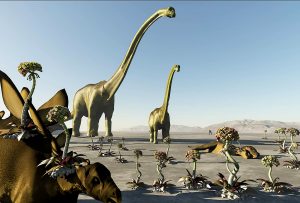
Credit : M Rigaux
The plants smelled with delight at the hordes of dinosaurs thundering toward them. It had taken them a long time to entice the gigantic beasts so far south. Pheromones, flower emissaries, sweet odors. They had used all their knowledge in their effort to feed. They lived around the southern pole and only a tight land bridge linked it to the other continents.
They had awakened from the great sleep when the great meteorite had crashed on the far north. The crash had released so much dust the sky had darkened for several years. The heat had increased below it and when it had cleared again, antartica had melted, freeing the plants and their ravenous hunger. At first, vast hordes of allosaurs had answered their crude call and the feast had been huge. An harvest of meat like they had never known.
Before the long sleep, they had already fed on live meat. So far south, this was the only way to gather enough energy to face the harsh winters. At that time, animals were small and unsavory. Nothing to compare to the giants. When the allosaurs had stopped coming, the plants had improved on their techniques and new giants had come. Hordes after hordes. So many. Such a feast. Then they had stopped coming. Until today.
The plants were hungry after the long wait, starving and yearned for fresh meat. The vines straightened, ready to block and paralyse the diplodocus and tyrannosaurus, the meat of choice in the jungle. Flowers began to release their deadly spores on the path of the horde. Dinner would be good.
The plentiful time would end soon. The plants felt in the earth and in the wind they had eaten all the beasts worth catching. There were smaller animals here and there but they were too small and too difficult to lure down there. The plants would return to their hibernation. They had seen the changes in the skies. The weather would turn again colder for a long time. The plants would wait. They had done so for millions of years . They were patient. They didn’t mind.
Iain MacEdward had been appointed as the lead biologist on Antartica Sunrise Farm as the result of an outstanding carreer, one where he had taken many risks to rise out of poverty. The company had been created, in the face of the global warming, to find if the soil found in antartica below thirty meters of ice could harbor life. And today, the seed he had found deep under the ice would germinate. In two months barely, he would show the world his new crop of fully local plants, plants that hadn’t grown since the last of the dinosaurs had walked on Earth. This was the news of a century. He would be famous.
The plants awakened. The air smelled of food.

 Fan of science fiction and fantasy, both of the great classics and of the indie authors, I have now taken the step to write my own books. I want to provide fun, adventure, and explore different universes.
Fan of science fiction and fantasy, both of the great classics and of the indie authors, I have now taken the step to write my own books. I want to provide fun, adventure, and explore different universes.